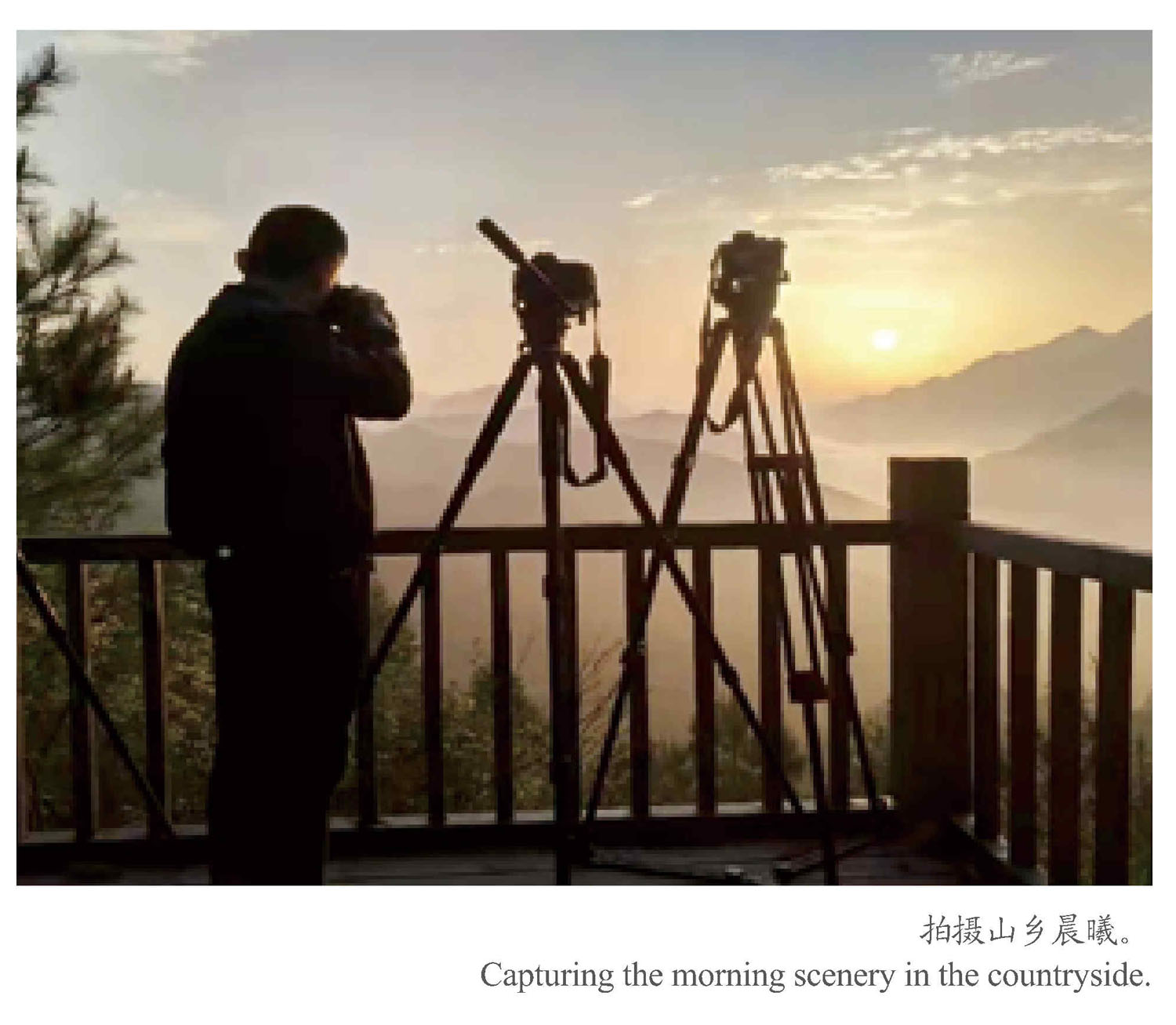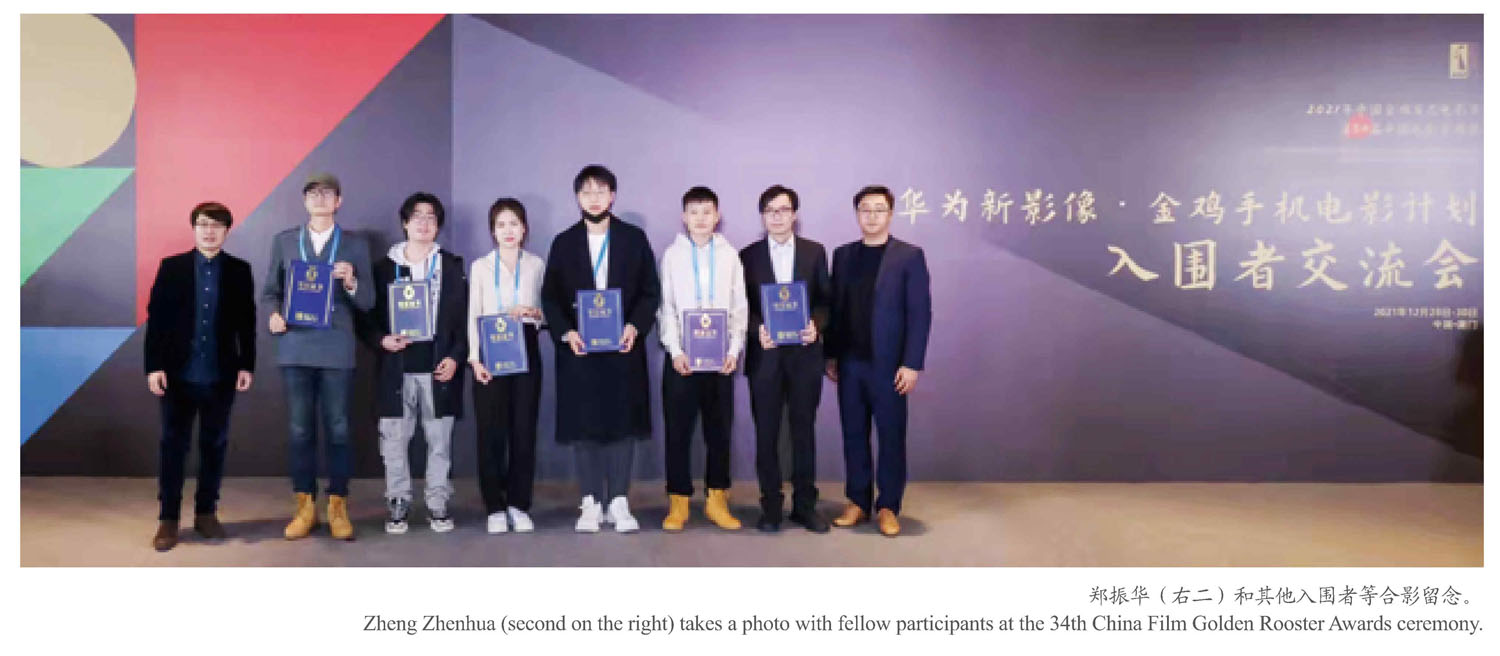用影像讲述丽水山乡致富故事
雷晓燕 杨世丹






丽水,是浙江面积最大的地级市,也是浙江典型的山区,九山半水半分田。
在丽水山区,活跃着一群普通人,他们跋山涉水,深入山村,用影像记录山区共同致富的故事,向人们讲述山民共同致富的梦想。
今年春节刚过,浙江星耀文化团队开始策划如何跟踪拍摄沿坑岭头村美丽乡村建设的故事。这项工作,他们已经持续了7年。
沿坑岭头村,是松阳县枫坪乡一个古老而又安详的小村庄。2012年,丽水职业技术学院副教授、油画家,沿坑岭头村指导员、第一书记李跃亮以艺术助力乡村振兴。如今,村庄每年吸引画家、高校艺术生、游客近3万人次,村民年增收300余万元。2015年起,“星耀文化”自筹经费,每年都在记录沿坑岭头村的发展脚步,记录一个濒临谢幕的村落如何一步步走向共同富裕。
“从没想过有生之年能走上金鸡电影节的红毯,从没想过有生之年自己的作品能在大银幕上出现。”两个“从没想过”,为“寻回”的2021年画上了圆满的句号。
寻回,真名郑振华,莲都人。2021年12月30日,他从第34届中国电影金鸡奖颁奖现场,捧回了金鸡奖组委会颁发的获奖证书——他的动画短片《与梦想一起,活下去》被评为第二届新影像 · 手机电影计划优秀作品。
和他一样,在丽水还有很多通过影像讲故事的追梦人。这群追梦人顶着星光,跋山涉水拍摄、制作、讲述丽水山乡致富的故事,向全国乃至全球传递正能量。
梦想,让他们心有沃土千亩
在丽水市电影家协会主席吴小东看来,无论是动画短片、短视频和微电影,都可以统称为微电影。就像2021年的丽水市第八届微电影大赛,也把短视频列入其中进行评比。
微电影又叫小电影,时长一般不超20分钟;而大电影是时长一两个小时的电影,比如我们在电影院看的电影,就是大电影。
每个热爱用影像讲故事的丽水人,都有自己的梦想。他们都很想把丽水人创业创新,丽水人的梦想,尤其是山区的乡村振兴用影像表现出来,让全国观众、全世界观众能了解丽水。
郑振华,1983年出生,现在丽水一家企业从事宣传工作。他一直喜欢并坚持写作,“希望自己的作品被拍成电影,给很多人带去感动和力量”。
2017年10月,他突发疾病,手术后伤口一直无法愈合,身体每况愈下,体重一度降至40公斤。到了当年年底,自感时日无多,忍着病痛折磨,躺在病床上按院线90分钟片长创作故事,想最后为梦想努力一次。
他告诉笔者,这样做,既是为了圆此生的电影梦,也是为了回报父母的养育之恩,感谢亲朋好友对他的关爱和照顾,“给他们留个念想”。
2018年2月,郑振华辗转至杭州求医,最终被确诊为罕见病克罗恩症。查明病因,也就有了对症的治疗方法和药物,身体慢慢恢复。
在这个过程中,他一边求医、接受治疗,一边学习制作电影的每道工序的技能,从故事剧本写作、粘土人物制作、场景搭建,到拍摄、后期、音效等。到2018年5月病假结束时,他已基本掌握制作电影的整体技能,作品也告成型。
郑振华说,如果不是梦想支撑着,他也不会走得这幺远。
与梦想奔跑的,还有很多人。
叶昕飞从业多年,坚持从一名丽水人的视角,拍摄、讲述丽水人的好故事,梦想着把丽水好故事搬上大银幕。眼下,他正在创作一部讲述革命战争年代地下女交通员的剧本。“希望能找到投资方,拍成大电影,进入院线,将丽水好故事告诉更多的人。”他说。
在新的一年,浙江星耀文化有限公司负责人蒋欣和导演陈维健时常聚在一起,商量着2022年在拍摄好微电影的基础上,尝试拍摄数字大电影或者网络大电影,一点点一步步向着大电影的梦想进发。
莲都区“90后”李晋大学毕业后,放弃考公务员,进入丽水的影视行业。从最基本的拍摄、剪辑开始,慢慢地学着写剧本、当导演,“全身心投入,希望今年能拍出好作品。”
……
与梦想前行,他们心有沃土千亩。
坚持,为了心中的那份情怀
吴小东介绍,丽水现有上百家影视公司和工作室,其中光市区就是70家左右。2021年,从丽水市第八届微电影大赛参赛作品来看,大部分是影视公司和工作室为职能部门或单位制作的宣传片。当然,这也成为他们最主要的经济来源之一。
抛去为了生计所作的努力,丽水用影像讲故事的人心中还是有所坚守的。
5年前,“星耀文化”出过一个公益短纪录片《画家 · ???村——沿坑岭头村的致富之路》,讲述松阳县枫坪乡沿坑岭头村的乡村振兴之路。为了达到理想的拍摄效果,两年时间里,摄制组20多次来到沿坑岭头村拍摄,最终拿出了这部长达12分钟的片子。
蒋欣介绍说,沿坑岭头村比较偏远,从丽水市区到村里,开车要两三个小时才能到。等到了目的地,全体摄制组起早摸黑,星月兼程,只为拍到满意的镜头。
“《画家 · 村》其实没有投资方,都是我们自发拍摄的。在我们看来,该村是艺术助推乡村振兴的成功案例。接下来,我们还会继续投资,继续跟踪拍摄,讲好丽水乡村振兴之路的典范。”他说。
这样的“傻事”,在2020年初的时候,“星耀文化”也干过。
2020年初,新冠肺炎疫情席卷而来,武汉封城,百业停摆。待在家里的陈维健自编自导自弹自唱,和朋友、同事一起制作了《一定能赢》《花开 · 无言》等5部公益作品,为医护人员喝彩,为抗击疫情加油。
陈维健说:“我们有情怀,也有自己的坚持。除了高质量完成任务,我们还会做一点公益,承担社会责任,为真善美、为时代点赞喝彩。”
郑振华也在坚持。
2020年,他看到消息,说中国电影金鸡奖组委会专门开设了“手机电影计划”单元,向全球征集电影短片。根据要求,他在原先的动画长片基础上,利用周末做成一部8分钟短片,并发送给组委会。
在笔者看来,《与梦想一起,活下去》绝对是部超低成本的微电影。
粘土是从网上购物平台花了10多元买来的,“人物是自己捏的,标准是能看出性别就行”;道具基本来自家里柴火间的废品,如鞋盒、吸管、三合板、塑料仿真植物等;灯光,用台灯蒙上糖纸,就有了色彩和光影;买不起摄像机,就用手机代替;配音,是AI合成的……
最后呈现的作品,采用粘土定格动画的形式,讲述了一名少年为追求梦想只身外出闯荡的故事。少年遇到了三位和自己一样历经磨难却仍坚持梦想的人,经历无数次失败后,许多人放弃了,但少年依然执着地追寻着梦想,直到他累倒在工作台前。
2021年初,作品完成。在署名上,郑振华给自己起了个“艺名”:寻回。
“‘寻回’的意义是不忘初心、不忘过往。在成长过程中,因为欲望与物质诱惑,很多人容易迷失自己。我希望将来能够通过创作,大力传承、发扬我们优秀的传统文化和民族特色。”
收获,追梦人的幸福源泉和目标
收获,总是在情理之中、意料之外。
去年10月,郑振华接到通知,说他的作品入围了,并邀请他参加颁奖仪式。据了解,这一届金鸡奖“手机电影计划”向全球征集到了4800多部作品,是上一届的15倍。通过层层筛选,最终评出37部入围作品。入围作品中,像他这样单枪匹马且超低成本制作的作品,还是唯一一部。
在电影节举办地厦门,他享受了明星般的待遇:专车接送,平生第一次走了明星常走的红毯,第一次在大布景墙上签下自己的名字。接着,领奖、开座谈会,聆听中国电影导演协会会长、着名导演李少红谈电影创作……“收获满满。”他高兴地说。
郑振华介绍说,“90多岁的外婆看了我的作品和荣誉证书,说了一句‘挺了不起的’。这是自外公走后,外婆最开心的一次。”
迎来收获的,还有很多影视公司和工作室。
在过去的2021年,《画家 · 村——沿坑岭头村的致富之路》《乡村机长》《秘密交通站》等多部微电影获得国家、省级相关比赛大奖。
而叶昕飞在去年12月迎来了丽水本土大电影《等待秋沙鸭》的公映。他在这部讲述坚守在松阴溪边的护鸟志愿者和他儿子寻找“国宝”中华秋沙鸭的故事中担任监制。
看着为之付出努力的大电影公映,他欣喜中又满怀期待——2022年,他担任制片人、编剧和导演的大电影《我们的村庄》已经送审,期待今年能拿到公映许可证“龙标”,实现自己的大电影梦。
“90后”追梦人李晋经过3年多的历练,收获了成长。他说,从编剧的角度来说,乐趣在于塑造了有血有肉的人物,并让他们“游走”于故事之间,历经成长,直面挑战,并能启迪一些思考;从拍摄现场的角度而言,乐趣在于戏比天大,体验与享受角色带来的心境与思考,创造让人信服的环境和细节,以及考量现场的方方面面,包括应对突发情况。“一群小伙伴心往一处想,力往一处使,也是弥足珍贵的美好记忆。”李晋如是说。
站在2022年的起点上,丽水这群用影像讲故事的人又开始“赶考”、追梦。
就像郑振华对笔者说的,当时把《与梦想一起,活下去》当成“最后一个作品”,现在倒是成了一个“新起点”,激励他更好地活下去、创作下去,“能够通过创作,给别人的人生带去一点正能量,这也是我此生最大的幸福”。
这,也是其他追梦人的幸福源泉和目标。
Telling Stories of Rural Revitalization through Films: Common Prosperity in Lishui
By Lei Xiaoyan ?Yang Shidan
“Never did I dream I would be on the red carpet of the Golden Rooster and Hundred Flowers Film Festival, and never did I dream that my work would appear on the big screen,” said “Xun Hui”.
“Xun Hui” is the stage name of Zheng Zhenhua, from Liandu District in Lishui city. On December 30, 2021, he won the 34th China Film Golden Rooster Award, one of the most prestigious film awards in China, for his animated short film Live for Your Dreams.
Born in 1983, Zheng works for an enterprise in Lishui. He loves writing. “My dream is that my words will be made into films and touch people,” he said.
In October 2017, Zheng suddenly became ill. After operation, the wound did not fully heal, and his weight dropped to 40kg. But he remained driven by his desire to produce films. Even while lying in bed and in great pain, knowing that his time was not long, he still worked on a script for a 90-minute film.
It was not only to fulfill his own dreams, but also to pay back his parents for raising him and to thank his relatives and friends for their love and care. “I wanted to leave something for them to remember me after I was gone.” In February 2018, Zheng was diagnosed with Crohn’s disease, a very rare disease. With a clear diagnosis, he gradually recovered after targeted treatment.
It was during this period, while visiting doctors and receiving treatment, that he began to learn the skills required for producing a film, such as script writing, making clay characters and sound effects, most of which he had mastered by the end of his sick leave in May 2018. Zheng said that if it weren’t for this dream, he wouldn’t have gone that far.
In 2020, he saw the news that the Golden Rooster Award set up a “Mobile Film” category, opening to short films from all over the world. He made an 8-minute short film, and sent it to the organizing committee. His work won out among the 4,800 submissions.
“When my 90-year-old grandma watched the film and saw the award certificate, she said ‘I am proud of you!’” Zheng said. “This was her happiest moment since grandpa passed away.”
Live For Your Dreams is undoubtedly an ultra-low-cost micro film.
The clay was bought online for less than 20 yuan. All the clay characters were made by himself. Props were basically made from domestic wastes, such as shoeboxes, straws, plywood pieces, plastic simulated plants. As for lighting, the lamp was covered with candy wrappers to create the effect of colors and shades. The mobile phone camera was used to take the place of professional film cameras. And dubbing was synthesized by AI ....
The final work came out in the form of stop-motion clay animation, telling the story of how a boy pursued his dream on his own. He met three other friends who, like him, wanted to pursue their dreams after going through various hardships. The others gave up at last after being defeated time after time. He was the one who persisted until he collapsed at his workbench.
The micro film was completed at the beginning of 2021, signed with his stage name—“Xun Hui”.
“Xun Hui means ‘staying true to the original aspiration and never forgetting the past’. In the process of growing up, many people are likely to get lost in various desires and material temptations. I hope more Chinese people will pass on the traditional Chinese culture after watching my works.”
In Lishui, there are a lot of aspiring film makers like Zheng who are pursuing their dreams and long to tell their stories through motion pictures. Indeed, many filmmakers specifically focus on rural revitalization in this area and regale audiences from both home and abroad with touching stories.
Ye Xinfei is one of them. Ye has been working on filming for many years. He insists on shooting and telling the good stories of Lishui people from the perspective of a local person, dreaming to taking them to the big screen one day. At present, he is writing a script about a female underground messenger during the revolutionary war. “Hopefully, I can find investors to make it into a big film to be played in the cinema, and share the good stories of Lishui with more people,” he said.
Li Jin, a “post-90s” (born in the 1990s) from Liandu district, entered the film and television industry in Lishui after graduating from university, instead of taking the civil service examination. He started his filmmaking dream from the most basic work, such as shooting and editing, to script writing and directing. “I am devoted to it, and hopefully I can produce good works this year.”
Since 2015, Zhejiang Xingyao Culture Media has been recording the metamorphosis of Yankenglingtou — a remote village in Lishui’s Songyang county — from being almost deserted to an icon of heritage culture and common prosperity. Five years ago, the company released a short documentary titled Village Painters: The Way to Get Rich in Yankenglingtou. In order to achieve the ideal shooting effect, the film crew visited to the village more than 20 times in two years, before they finally presented this 12-minute film.
Jiang Xin, head of the company, said that since it is a remote village, about two to three hours’ drive from the city center, in the two years of filming, the crew often worked from dawn to dusk, in order to get a satisfactory effect.
“In fact, this documentary was produced without any investors. But it was worthwhile, for this is a successful example of rural revitalization boosted by art. We will continue our investment and follow up the shooting, showcasing the models of rural revitalization in Lishui,” he added. Nowadays, the village attracts over 30,000 artists and tourists each year. The annual income of the villagers has increased by more than 3 million yuan. And together with Chen Weijian, the director, Jiang and his crew are still following up on the story of the village.
Such a “thankless effort” is not the only case for Chen, Jiang and their team.
In early 2020 when COVID-19 hit Wuhan, the whole city was locked down. Staying at home writing, directing, singing and playing musical instruments, Chen produced five public benefit musical works, including Be Sure to Win and Blooming in Silence, to cheer for the medical workers and the fight against the epidemic.
Chen said, “We have both passion and commitment to our dreams. In addition to finishing our daily work with high quality, we also do non-profit projects and undertake social responsibilities, to cheer for the goodness and beauty in our times.”
In fact, Lishui is home to hundreds of film and television companies and studios, including about 70 in the city area, according to Wu Xiaodong, chairman of Lishui Filmmakers’ Association. They have accomplished a lot as well. In 2021, a number of micro films including Village Painters: The Way to Get Rich in Yankenglingtou, Country Captain and Underground Communication Station, among others, won many national or provincial awards.
In December last year, Ye saw the release of his film Meet the Mergansers. It tells the story of how a bird protection volunteer and his son kept searching for the mergansers which are rare.
Seeing the release of his big film that he had worked hard for, he was in delightful expectation— in 2022, Our Village, in which he has served as the producer, screenwriter and director, has been submitted for review. He is looking forward to getting the official release license this year to live up to his “big film” dream.
Li, the post-90s dreamer, has grown a lot after three years’ working experience. He found pleasure in different roles. As a screenwriter, it is fun to create those characters with flesh and blood, letting them live in his stories, experiencing growth, meeting challenges, and inspiring others to think. As for working on the scene, the fun lies in the spirit of devotion to art, totally absorbed in the state of mind of the characters, creating convincing environment and details, as well as taking everything into consideration and coping with unexpected situations. “It is a precious memory for a group of people to work together for the same film-making dream,” he said.
At the beginning of 2022, with their films, this group of Lishui storytellers are making a new start, embarking on the way to pursue their dreams against all kinds of challenges.
Zheng once considered Living for Your Dreams as “his last work”, but now it has turned into “a starting point”, encouraging him to live better and create more works. “Being able to bring some positive energy to others through my works is the source of great happiness in my life.”
This is also the source of happiness and goal of other dream pursuers in Lishui.
scicat.cn202203282238

